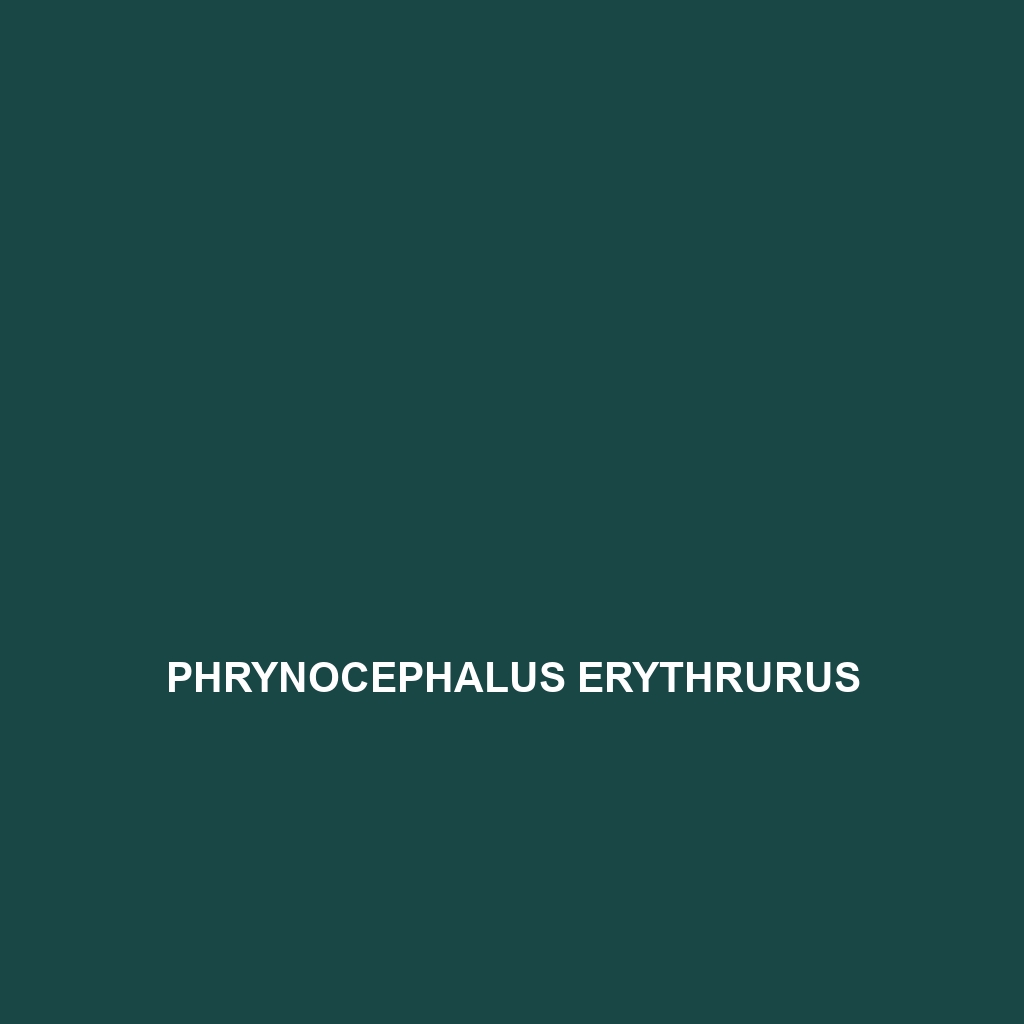<short_description>Discover the <b>Platyceps ladacensis</b>, or Ladac's snake, a slender and agile reptile found in Central Asia's arid regions. With a unique coloration for camouflage, this diurnal insectivore plays a vital role in its ecosystem by controlling insect populations and serving as a food source for larger predators.</short_description>
Tag: Mongolia wildlife
Phrynocephalus maculatus
<p><b>Phrynocephalus maculatus</b>, commonly known as the spotted toad-headed agama, is a medium-sized lizard thriving in the arid regions of Central Asia, characterized by its flattened body, unique coloration, and remarkable sand-burrowing ability. This insectivorous species plays a crucial role in maintaining ecological balance while adapting to harsh desert conditions.</p>
Phrynocephalus erythrurus
The Phrynocephalus erythrurus, or red-headed agama, is a medium-sized lizard native to the arid regions of Central Asia, recognized for its vibrant red or orange head, flattened body, and unique adaptations to harsh environments. This insectivorous species thrives in rocky terrains and plays a vital role in its ecosystem by controlling insect populations and serving as prey for larger predators.
Phrynocephalus clarkorum
Introducing the remarkable Phrynocephalus clarkorum, a moderate-sized lizard native to the rocky desert landscapes of Central Asia. This diurnal insectivore exhibits unique camouflage abilities, fascinating behaviors, and plays a vital role in its ecosystem by controlling insect populations.
Eremias roborowskii
Discover the Eremias roborowskii, or Roborowski's sand lizard, a small, agile reptile native to the arid regions of Central Asia. This fascinating lizard, known for its sandy-brown coloration and exceptional speed, thrives in open grasslands and sandy deserts, where it plays a vital role in maintaining the ecological balance as both a predator and prey.
Eremias papenfussi
Introducing the Eremias papenfussi, or Papenfuss’s racerunner, a slender lizard native to arid regions of Central Asia, known for its smooth, metallic scales and exceptional speed. This insectivorous species thrives in sandy habitats, playing a vital role in controlling insect populations and maintaining ecological balance.
Chiru
Discover the intriguing world of the Snow Sheep (*Ovis nivicola*), a medium-sized ungulate native to the rugged terrains of eastern Siberia and northern Mongolia. With their distinctive white fur, long curved horns, and adaptive behaviors, these social animals thrive in harsh alpine environments. Unfortunately, the Snow Sheep faces threats such as habitat loss and poaching, making their conservation crucial for maintaining the delicate balance of their ecosystem.
Gobi Serotine
Discover the fascinating <strong>Gobi Serotine</strong>, a medium-sized bat native to the arid expanses of the <strong>Gobi Desert</strong> in northern China and Mongolia. Adapted to survive in harsh climates, these nocturnal hunters play a crucial role in pest control, predominantly feeding on insects like moths and beetles. With a conservation status of <strong>vulnerable</strong>, understanding their unique behaviors and ecological importance is essential for their preservation.</p>
Mount Banahaw Shrew Rat
Discover the intriguing world of the Khingan Zokor, a medium-sized rodent native to the dense forests and grasslands of Mongolia and northern China. Known for their extensive burrow networks and nocturnal foraging habits, these fascinating creatures play a vital role in soil aeration and ecosystem balance. Learn about their unique behavior, diet, and the conservation challenges they face in this detailed exploration of their life and habitat.
Principal Gerbil
Discover the fascinating world of the Principal Gerbil, a remarkable creature native to the arid regions of Central Asia. Adapted to its sandy desert habitat with its tufted tail, large eyes, and powerful hind legs, this nocturnal herbivore plays a vital role in its ecosystem through burrowing and seed dispersal. While currently not classified as endangered, the Principal Gerbil faces challenges from habitat loss and environmental changes, making conservation efforts critical for its survival.









